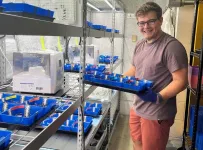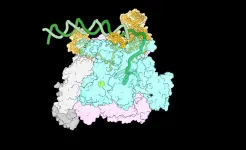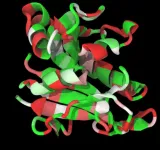(Press-News.org) Reducing consumption of processed meat by around one-third could prevent more than 350,000 cases of diabetes in the US over 10 years, a study suggests.
Cutting US adults’ processed meat intake by 30 per cent – the equivalent of around 10 slices of bacon a week – would also lead to tens of thousands of fewer cases of cardiovascular disease and colorectal cancer, researchers say.
A team from the University of Edinburgh’s Global Academy of Agriculture and Food Systems together with the University of North Carolina, Chapel Hill, has developed a simulation tool to estimate the health impacts of reducing consumption of processed meat and unprocessed red meat.
While many studies have identified links between high levels of processed meat consumption and chronic disease, few have evaluated the impact on multiple health outcomes. Some previous research also suggests unprocessed red meat may contribute to chronic disease risk but evidence is still limited.
The researchers used data from a Centers for Disease Control and Prevention (CDC) national health survey to create a simulated, representative sample of the US adult population – a so-called microsimulation.
Their microsimulation is the first to estimate the effects of reducing processed meat and unprocessed red meat consumption – from between 5 and 100 per cent – on multiple health outcomes in the US.
The team estimated how changes in meat consumption affect adults’ risk of diabetes, cardiovascular disease, colorectal cancer and death. The effects were evaluated in the overall population and separately based on age, sex, household income and ethnicity.
As well as preventing more than 350,000 cases of diabetes, cutting processed meat intake by 30 per cent would lead to 92,500 fewer cardiovascular disease cases and 53,300 fewer colorectal cancer cases over a decade, researchers say.
In this scenario, white males and those with an annual household income between $25,000 and $55,000 were found to experience the greatest health benefits.
Researchers also analysed the impacts of reducing unprocessed red meat intake alone and cutting consumption of both processed meat and unprocessed red meat.
Reducing consumption of both by 30 per cent resulted in 1,073,400 fewer diabetes cases, 382,400 fewer cardiovascular disease cases and 84,400 fewer colorectal cancer cases.
Cutting unprocessed red meat intake alone by 30 per cent – which would mean eating around one less quarter-pound beef burger a week – resulted in more than 732,000 fewer diabetes cases. It also led to 291,500 fewer cardiovascular disease cases and 32,200 fewer colorectal cancer cases.
The finding that more disease cases were prevented by reducing unprocessed red meat compared to processed meat is partly due to the average daily intake of unprocessed red meat being higher than processed meat, at 47g a day versus 29g a day, respectively.
As less is known about the effect of eating unprocessed red meat on chronic disease risk, the team says these estimates should be interpreted with caution and that more research is needed.
The study, published in The Lancet Planetary Health journal, was funded by The Wellcome Trust.
Professor Lindsay Jaacks, Personal Chair of Global Health and Nutrition at the University of Edinburgh, and one of the authors of the study, said “Cutting consumption of meat has been recommended by national and international organisations to reduce greenhouse gas emissions, including the Climate Change Committee here in the UK and the United Nations Intergovernmental Panel on Climate Change or IPCC. Our research finds that these changes in diets could also have significant health benefits in the US, and so this is a clear win-win for people and planet.”
END
Cuts to processed meat intake bring a range of health benefits
2024-07-04
ELSE PRESS RELEASES FROM THIS DATE:
Pioneering Code of Practice released for use of stem cell-based embryo models in research
2024-07-04
Stem cell-based embryo models (SCBEMs) are three-dimensional biological structures that mimic aspects of early human embryo development. They can be created in the lab from stem cells, and can provide new insights into critical stages of early human development that are normally inaccessible to researchers.
Embryo model work is expected to lead to new interventions for a range of conditions, including revolutionising treatments for recurrent miscarriage, understanding developmental disorders and improving the success rate of IVF.
Although embryo models are not the same ...
First study to measure toxic metals in tampons shows arsenic and lead, among other contaminants
2024-07-04
Tampons from several brands that potentially millions of people use each month can contain toxic metals like lead, arsenic, and cadmium, a new study led by a UC Berkeley researcher has found.
Tampons are of particular concern as a potential source of exposure to chemicals, including metals, because the skin of the vagina has a higher potential for chemical absorption than skin elsewhere on the body. In addition, the products are used by a large percentage of the population on a monthly basis—50-80% of those who menstruate use tampons—for several hours at a time.
“Despite this large potential for public health concern, very little research ...
Rice researchers uncover key mechanisms in chromosome structure development
2024-07-03
Researchers at Rice University are making strides in understanding how chromosome structures change throughout the cell’s life cycle. Their study on motorized processes that actively influence the organization of chromosomes was published in the Proceedings of the National Academy of Science.
“This research provides a deeper understanding of how motorized processes shape chromosome structures and influence cellular functions,” said Peter Wolynes, study co-author and the D.R. Bullard-Welch Foundation Professor of Science. ...
Rice research aims to reprogram the genetic code
2024-07-03
Rice University chemist Han Xiao has been awarded nearly $2 million from the National Institutes of Health Maximizing Investigators’ Research Award (MIRA) program for established investigators.
All organisms with few exceptions use 20 standard amino acids to build proteins. Xiao’s research aims to reprogram the genetic code to precisely manipulate biological systems by using noncanonical amino acids (ncAAs) with diverse properties to help build proteins. Researchers generally use ncAAs to investigate the structure and dynamics of proteins, but Xiao wants to take that a step further.
“This innovative approach could revolutionize how ...
Home test reveals the risk of heart attack in five minutes
2024-07-03
Swedish researchers have created a questionnaire test for home use that quickly identifies high risk of heart attack. A study shows that it has the same level of accuracy as blood tests and blood pressure measurements.
The study, published in Journal of the American Heart Association, uses data from the SCAPIS population study, which is based at the University of Gothenburg, with the Swedish Heart Lung Foundation as its main sponsor.
The study was led by Göran Bergström, Professor of Clinical Physiology at Sahlgrenska Academy at the University of Gothenburg, senior ...
New tuberculosis vaccine results presented at FAPESP Week China
2024-07-03
Researchers from the Butantan Institute and collaborators are developing a more potent version of the BCG vaccine that protects against tuberculosis. While the conventional immunizer reduced infection by 90% in experiments with mice, the so-called recombinant BCG increased the protection rate to 99%. In addition, the new formulation protected the animals for a significantly longer period of time.
“BCG is the first vaccine we receive at birth, and it’s indeed effective in protecting children. But immunity against the disease tends to wane in adulthood, and as bacteria are becoming resistant to antibiotics, no ...
Wastewater is a viable medium for growing lettuce in hydroponic systems, study shows
2024-07-03
URBANA, Ill. – Urban agriculture has the potential to improve food security through local, efficient, and sustainable food production. Examples of urban food systems include hydroponics, where plants grow in a nutrient solution without soil, and aquaponics, which combines hydroponics with raising fish in tanks.
A new study from the University of Illinois Urbana-Champaign examines the use of aquaponics wastewater as a growth medium for lettuce in a hydroponic system. This practice can potentially ...
Researchers capture never-before-seen view of gene transcription
2024-07-03
Every living cell transcribes DNA into RNA. This process begins when an enzyme called RNA polymerase (RNAP) clamps onto DNA. Within a few hundred milliseconds, the DNA double helix unwinds to form a node known as the transcription bubble, so that one exposed DNA strand can be copied into a complementary RNA strand.
How RNAP accomplishes this feat is largely unknown. A snapshot of RNAP in the act of opening that bubble would provide a wealth of information, but the process happens too quickly for current technology to easily capture visualizations ...
Do genes-in-pieces code for proteins that fold in pieces?
2024-07-03
A new study led by Rice University’s Peter Wolynes offers new insights into the evolution of foldable proteins. The research was published in the Proceedings of the National Academy of Sciences.
Researchers at Rice and the University of Buenos Aires used energy landscape theory to distinguish between foldable and nonfoldable parts of protein sequences. Their study illuminates the ongoing debate about whether the pieces of DNA that code for only part of a protein during their origins can fold on their own.
The researchers focused on the extensive relationship between exons in protein structures and the evolution of protein foldability. They highlighted ...
Can inflammation in early adulthood affect memory, thinking in middle age?
2024-07-03
MINNEAPOLIS – Having higher levels of inflammation in your 20s and 30s may be linked to having memory and thinking problems at middle age, according to a study published in the July 3, 2024, online issue of Neurology®, the medical journal of the American Academy of Neurology. The study looked at levels of C-reactive protein (CRP) in the blood. CRP is produced by the liver and increases when there is inflammation in the body. The study does not prove that having higher levels of this protein causes dementia. It only shows an association.
There are two kinds of inflammation. Acute inflammation happens when the body’s immune response jumps into action to fight off infection or ...







